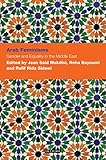Arab feminisms : gender and equality in the Middle East /
Title By: Makdisi, Jean Said [Editor.] | Bayoumi, Noha [Editor.] | Sidawi, Rafif Rida [Editor.]
Material type: BookSeries: Contemporary Arab scholarship in the social sciences ; 7.Publisher: London : I.B. Tauris, c2014.Description: xxxvi, 440 p. ; 24 cm.ISBN: 9781780766720Subject(s): Muslim women -- Middle East -- Social conditions | Women -- -- Middle East -- Social conditions | Feminism -- Middle East | Feminism -- Religious aspects -- IslamDDC classification: 305.420956 AR AB Online resources: Location Map
BookSeries: Contemporary Arab scholarship in the social sciences ; 7.Publisher: London : I.B. Tauris, c2014.Description: xxxvi, 440 p. ; 24 cm.ISBN: 9781780766720Subject(s): Muslim women -- Middle East -- Social conditions | Women -- -- Middle East -- Social conditions | Feminism -- Middle East | Feminism -- Religious aspects -- IslamDDC classification: 305.420956 AR AB Online resources: Location Map | Item type | Home library | Call number | Status | Date due | Barcode | Item holds |
|---|---|---|---|---|---|---|
| REGULAR | University of Wollongong in Dubai Main Collection | 305.420956 AR AB (Browse shelf) | Available | T0010630 |
, Shelving location: Main Collection Close shelf browser

|

|

|

|

|

|

|
||
| 305.420954 FO PI Pink sari revolution : | 305.420954 JE WO Women in contemporary society | 305.420954 NA HU Hungry translations : | 305.420956 AR AB Arab feminisms : | 305.420956 MO MO Modernizing women : | 305.420956 MO MO Modernizing women : | 305.420956 WO ME Women in Middle Eastern history : |
Introduction. Jean Said Makdisi, Noha Bayoumi & Rafif Sidawi. PART I: Variety in Understanding Feminist Concepts and Discourse Chapter 1: What Do Women Want? A Critical Mapping of Future Directions for Arab Feminisms. Mervat Hatem. Chapter 2: Gender Studies in the Arab World: Reflections and Questions on the Challenges of Discourses, Locations and History. Hoda Elsadda. Chapter 3: Recognition of Difference: Towards a More Effective Feminism. Najla Hamadeh. Chapter 4: Research Methods and Probing Feminist Thought. Nahawand el-Kadri Issa. Chapter 5: From Women's Rights to Feminism: The Urgent Need for an Arab Feminist Renaissance. Zeina Zaatari. Chapter 6: Feminist Discourse in the Arab Theatre. Watfa Hamadi. Chapter 7: Huqouq al Mar'a: Feminist Thought and the Language of the Arab Women's Movements. Jean Said Makdisi. Chapter 8: Femininity and Feminist Studies: Research, The Researcher, and Cultural Constrictions in Lebanon. Noha Bayoumi. Chapter 9: The Creative Arab Woman: Opposing the Stereotypical Image and Dismantling the Prevalent Discourse. Fawzia Abdullah Abu-Khaled. Chapter 10: Does Saudi Feminism Exist? Hatoon Ajwad el-Fassi. Chapter 11: Arab Feminism: Obstacles and Possibilities. Suad Zayed Al-Oraimi. Chapter 12: The Cultural Frameworks and Theoretical Boundaries of Arab Feminism. Kulthum Ghanem. Chapter 13: Feminism's Difference Problem. Joan W. Scott. Chapter 14: Feminism as Critique. Nivedita Menon. PART II: The Crisis of Feminism in the Context of War, Civil Conflict, and Military Occupation Chapter 15: Feminism Between Secularism and Islamism: The Case of Palestine. Islah Jad. Chapter 16: Palestinian Feminist Organisations in the Post-Oslo Era:The Binary Nature of Feminist Discourse. Eileen Kuttab. Chapter 17: Liberation Struggles: Reflections on The Palestinian Women's Movement. Amal Amireh. Chapter 18: Indigenising Feminist Knowledge: Palestinian Feminist Thought between the Physics of International Power and the Theology of Racist "Security". Nadera Shalhoub-Kevorkian. Chapter 19: The Developing Role of Colonial Feminists in Iraq. Haifa Zangana. Chapter 20: Women's Resistance and Struggle in Afghanistan and Diasporic Communities. Elaheh Rostami-Povey. Chapter 21: Women Struggling against the Legacy of Colonialism in East Asia. Mari Oka. Chapter 22: Conflicts and Wars: Women's Silent Discourse. Anicee Al Amine Merhi. Chapter 23: The Role of Feminist Movements in Establishing Peace and Improving The Condition of Women in Areas of Armed Conflict. Amira Yousef al-Badri. Chapter 24: Terrorizing Masculinities and Ambivalent Responses in Wajdi Mouawad's Scorched. Dina Georgis. Chapter 25: The Child Torn between War and the Adult World: In the Battlefields by Danielle Arbid. Dalia Said Mustafa. PART III: Islamic Feminism: Approaches and Visions Chapter 26: Sisters in Islam. Zainah Anwar. Chapter 27: Accounting for Affect: Kuwaiti Women Between Freedom and Apathy. Mai Al-Nakib. Chapter 28: Islamic Feminism in Egypt: Between Acceptance and Rejection. Hoda El-Saadi. Chapter 29: Islamic Feminism: A New Feminist Movement or a Strategy by Women for Acquiring Rights? Amal Grami. Chapter 30: Trends and Directions in Contemporary Islamic Feminist Research. Omaima Abou-Bakr. Chapter 31: Poststructuralist Theory and Women in the Middle East: Going in Circles? Marnia Lazreg. Chapter 32: Two Faces of the Revivalof Feminist Qur'anic Exegesis: 'A'ishaAbd al-Rahman and Amina Wadud. Husn Abboud. Chapter 33: Rokeya In The World: Feminism And Islam In 20th Century Bengal. Elora Shehabuddin. PART IV: Feminism in a Global Context Chapter 33: Tracing Dollars, Mapping Colonial Feminism: America Funds Women's 'Democracy' Training in Iraq. Shahrzad Mojab. Chapter 34: Gender in Modern Counterinsurgency. Laleh Khalili. Chpater 35: Reading Between the Lines: Sexual Politics and Publishing in the Age of Public Diplomacy. Vron Ware. Chapter 36: The Blind Traditional Subject and Suitcase Patriarchies. Kumkum Sangari. Chapter 37: Black Feminism and the World. Hazel Carby. Chapter 38: Between Feminism and Social Engineering: The Troubled Trajectory of International Gender Activism. Deniz Kandiyoti.
Is there a truly Arab feminist movement? Is there such a thing as 'Islamic' feminism? What does it mean to be a 'feminist' in the Arab world today?
